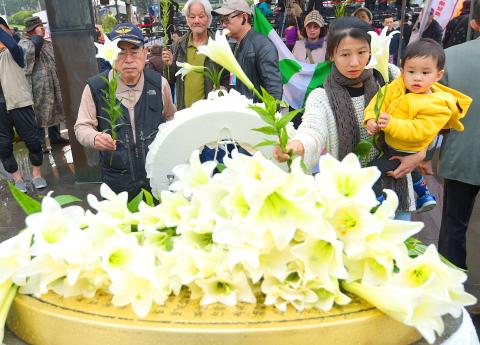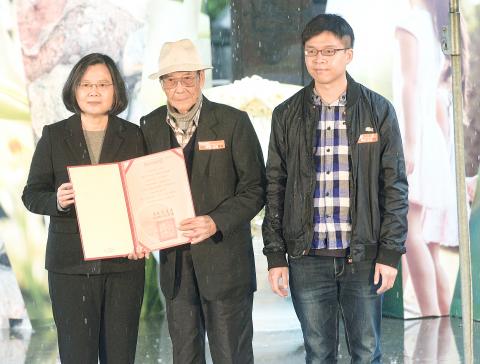On the 71st anniversary of the 228 Incident, President Tsai Ing-wen (蔡英文) yesterday pledged to ascertain responsibility for the 228 Massacre, as she called for reconciliation and promised increased efforts to uncover and make public more information about the massacre and past authoritarian injustices.
Yesterday was the first observed anniversary of the Incident following the passage of the Act on Promoting Transitional Justice (促進轉型正義條例) on Dec. 5 last year, a major step toward coming to terms with Taiwan’s tragic past, Tsai said.
The passage necessitates the establishment of a committee on promoting transitional justice, which would be responsible for collecting and making public political archives, removing authoritarian symbols and redressing judicial injustices.

Photo: Chang Chia-ming, Taipei Times
Tsai said she would ask the committee to write a report on transitional justice with a special chapter dedicated to the massacre, which should reveal the truth and name those who were behind the violence following the Incident, which led to the White Terror era.
“The report should be a systematic examination of the persecution of the authoritarian era and be accompanied with recommendations. I hope Taiwan, through transitional justice, can become a freer and more democratic nation with better human rights protections,” Tsai said.
Discoveries about the massacre are still being made, as in the past year, the National Archives Administration, Academia Sinica and the 228 Memorial Foundation have identified more than 1,000 possible victims of the White Terror era through government archives, Tsai said.

Photo: Chang Chia-ming, Taipei Times
The South Korean blockbuster Taxi Driver is a cinematic reflection of that nation’s authoritarian past, and the Ministry of Culture is encouraging more creative projects about Taiwan’s transitional justice to make its history known to the world, she said.
“Suffering does not end by pretending it is not there. Only by facing it do we have a chance to start again. That is why Taiwan has to achieve transitional justice,” she said.
“I hope, when it comes to the ‘Taiwan miracle,’ that the world will not only recognize the nation’s economic development and democratization, but also our successes in transitional justice,” Tsai added.
Meanwhile, Premier William Lai (賴清德) said that the Cabinet would immediately nominate the members for the committee to be approved by the legislature, while providing the committee with sufficient authorization and funding to uncover more truths about the Incident.
Lai’s promise was made in response to the comments of Lin Li-tsai (林黎彩), a 228 Memorial Foundation director and relative of a victim of the Incident.
Lin said the government failed to identify Chiang Kai-shek (蔣介石) as the main culprit of the Incident and limited the functions of the foundation due to insufficient government authorization.

Conflict with Taiwan could leave China with “massive economic disruption, catastrophic military losses, significant social unrest, and devastating sanctions,” a US think tank said in a report released on Monday. The German Marshall Fund released a report titled If China Attacks Taiwan: The Consequences for China of “Minor Conflict” and “Major War” Scenarios. The report details the “massive” economic, military, social and international costs to China in the event of a minor conflict or major war with Taiwan, estimating that the Chinese People’s Liberation Army (PLA) could sustain losses of more than half of its active-duty ground forces, including 100,000 troops. Understanding Chinese

The Ministry of Foreign Affairs (MOFA) yesterday said it is closely monitoring developments in Venezuela, and would continue to cooperate with democratic allies and work together for regional and global security, stability, and prosperity. The remarks came after the US on Saturday launched a series of airstrikes in Venezuela and kidnapped Venezuelan President Nicolas Maduro, who was later flown to New York along with his wife. The pair face US charges related to drug trafficking and alleged cooperation with gangs designated as terrorist organizations. Maduro has denied the allegations. The ministry said that it is closely monitoring the political and economic situation

UNRELENTING: China attempted cyberattacks on Taiwan’s critical infrastructure 2.63 million times per day last year, up from 1.23 million in 2023, the NSB said China’s cyberarmy has long engaged in cyberattacks against Taiwan’s critical infrastructure, employing diverse and evolving tactics, the National Security Bureau (NSB) said yesterday, adding that cyberattacks on critical energy infrastructure last year increased 10-fold compared with the previous year. The NSB yesterday released a report titled Analysis on China’s Cyber Threats to Taiwan’s Critical Infrastructure in 2025, outlining the number of cyberattacks, major tactics and hacker groups. Taiwan’s national intelligence community identified a large number of cybersecurity incidents last year, the bureau said in a statement. China’s cyberarmy last year launched an average of 2.63 million intrusion attempts per day targeting Taiwan’s critical

AGING: As of last month, people aged 65 or older accounted for 20.06 percent of the total population and the number of couples who got married fell by 18,685 from 2024 Taiwan has surpassed South Korea as the country least willing to have children, with an annual crude birthrate of 4.62 per 1,000 people, Ministry of the Interior data showed yesterday. The nation was previously ranked the second-lowest country in terms of total fertility rate, or the average number of children a woman has in her lifetime. However, South Korea’s fertility rate began to recover from 2023, with total fertility rate rising from 0.72 and estimated to reach 0.82 to 0.85 by last year, and the crude birthrate projected at 6.7 per 1,000 people. Japan’s crude birthrate was projected to fall below six,